Also from today’s Maureen Dowd column; the Doonesbury thing has been pasted to the inside of my closet door for the last 26 and 1/2 years.
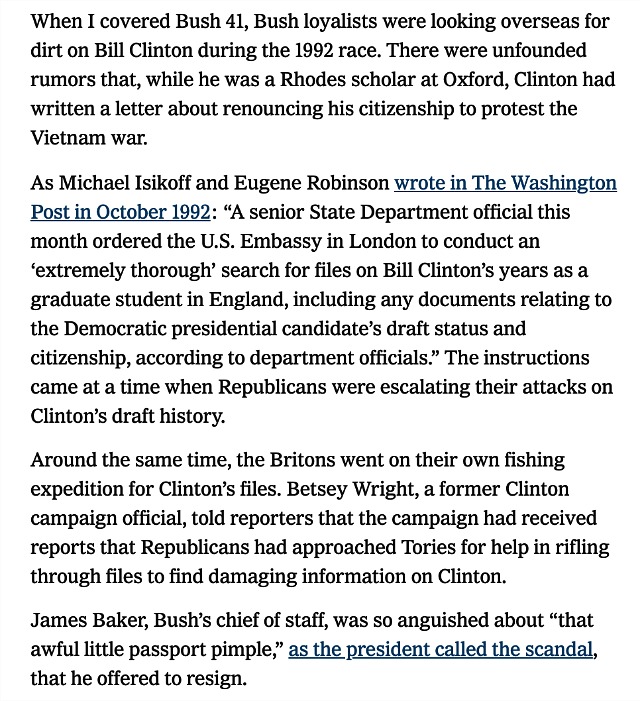
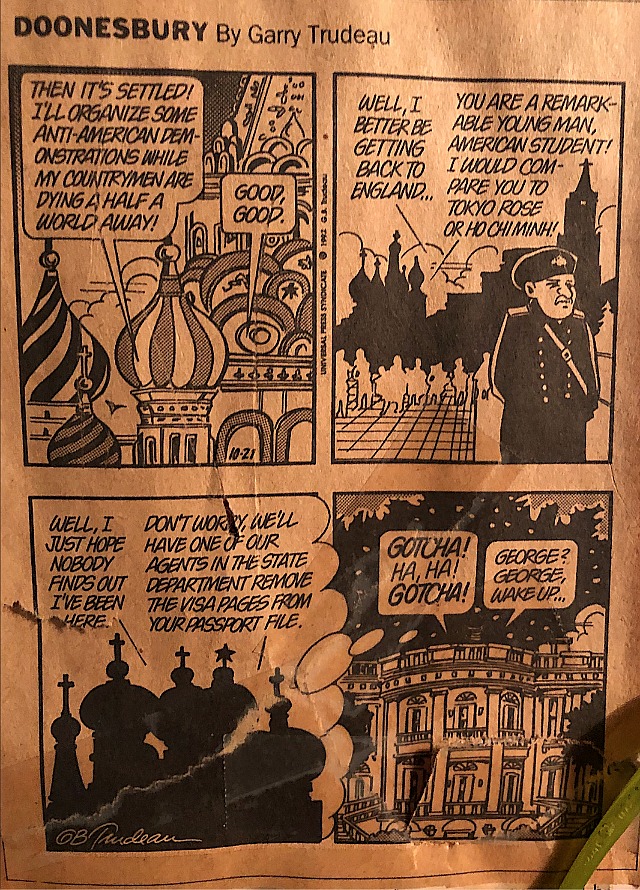
Also from today’s Maureen Dowd column; the Doonesbury thing has been pasted to the inside of my closet door for the last 26 and 1/2 years.


“The president is an unabashed gargoyle atop the White House, chomping on American values.
.
“The way Trump publicly wallows in his mendaciousness and amorality is unique in presidential history. His motto might as well be: ‘I cannot not tell a lie.’ His ego is too fragile to play patriarch to the country, so he takes the more ruinous role of provocateur.
“He makes it so easy for everyone to focus on the tweets and the maniacal, moronic reality show that you have to struggle to look away and take the measure of what he’s doing. And what he’s doing is altering domestic and foreign policy in terrible ways while running up huge deficits.
“The Trump White House may be a clown show and a criminal enterprise. But it’s also an actual presidency.
“It’s turning out to be a genuinely reactionary administration led by a wannabe authoritarian who refuses to recognize constitutional checks on power. The real danger is not the antics but the policies. If Trump isn’t careful, he’s going to add substance to his administration. And it won’t be the kind we want.” — from Maureen Dowd‘s “A Down and Dirty White House,” posted on 6.15.
I realize that I’m expected to adore Jonathan Demme‘s Melvin and Howard, but I could never quite manage that. I haven’t seen this amiable, slow-moving American dramedy since the initial release. I recall being more intrigued than head over heels after catching it at the old Magno screening room (now Dolby 88), and being faintly irked by Paul LeMat‘s performance as the kindly, none-too-brilliant Melvin Dummar. (Whom I met at a Manhattan press party, by the way — Dummar, not LeMat.) To be honest the only part I found truly fascinating was the pickup-truck scene between LeMat and Jason Robards‘ Howard Hughes. And of course the refrain ending.
I’d be interested in streaming Melvin and Howard for $3.99 but I can’t see forking over $30 for the Twilight Time Bluray. It falls between the cracks.
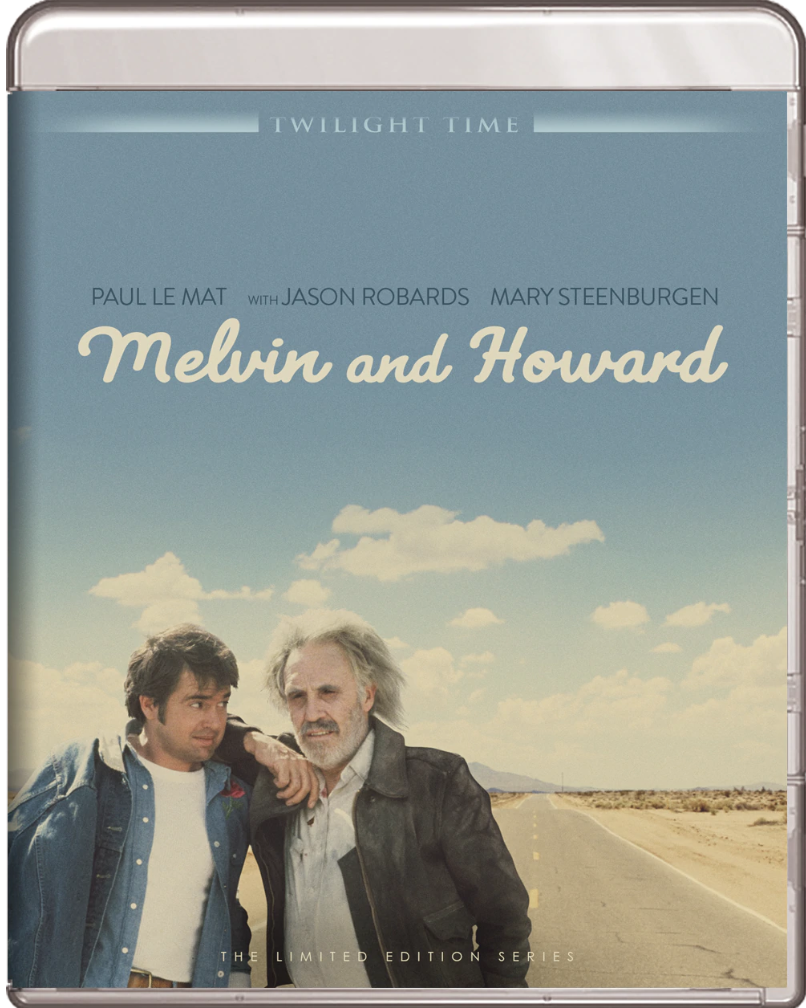
Roughly three weeks ago I posted a piece called “Thoughts of Fisticuffs.” It was largely…okay, mostly about my anger at people who deliberately blew smoke about the playability of Region 2 (or B) Blurays on U.S.-manufactured Region 1 (or A) Bluray players. The commenters compounded things by insisting that all I had to do to watch Region 2 Blurays on my Oppo BDP 103 was “push a few buttons.” Bullshit!
“Phat Abbot” said that “on the modified Oppo, power up the unit by pressing the 2 button on the remote to boot into Region B,” and that I can return to region A by powering up with the 1 button on the remote.” “Joe Gideon” added that “if you have the right model Oppo, it’s even easier than that — you don’t even have to power down. You just open the disc tray, press one of the four buttons to set the region code, and hit play.” More bullshit!

I hired a smart tech guy to come over and help with trying to convert the Oppo BDP 103 into a Region 2 (or B) player, and he said the only way it could happen would be to buy an OPPO DIGITAL BDP-103 BDP-105 DARBEE REGION FREE USB HARDWARE UPGRADE CABLE KIT.”
I found a couple of these devices on eBay. I ordered one; it arrived four or five days later. The same smart guy returned and inserted the device into the rear of my Oppo player, and then and only then would it play Region 2.
The way to switch regions is via the Oppo remote. You have to push DIMMER DIMMER DIMMER, and then MUTE, and then 2. And then you have to power the unit off. When you turn it back on, it will play Region 2. (You can switch back to Region 1 or even to Region 3 if you follow the same procedure.) But I couldn’t have made this work without installing the above-named cable kit.
Let every nation know, whether it wishes us well or ill, that Phat Abbot and Joe Gideon didn’t know what they were talking about.
This monster actually said “I got a little gettin’ even to do.”
“The most terrifying fact about the universe is not that it is hostile but that it is indifferent; but if we can come to terms with this indifference and accept the challenges of life within the boundaries of death, our existence as a species can have genuine meaning and fulfillment. However vast the darkness, we must supply our own light.” — Stanley Kubrick, sometime around 1966.
Coming Soon!!! pic.twitter.com/R1tXOuuLgO
— O.J. Simpson (@TheRealOJ32) June 15, 2019
“On June 10, two nights before Rolling Thunder Revue: A Bob Dylan Story by Martin Scorsese dropped on Netflix, I attended an event for the movie following its premiere at Lincoln Center. At the party, I got to sample reactions to the revelation that roughly 10 minutes of Scorsese’s back-to-the-’70s rock doc consists of prankish fake-documentary footage, like something out of a Christopher Guest movie.
“It wasn’t hard to gauge the reaction. In just about every case, when I asked people what they thought about the fakery, that was the very first they’d heard of it. (Unless you have extra sensory perception, you’re going to buy what this movie shows you.) Most of the people I spoke to were wide-eyed with disbelief yet kind of bummed. Over and over, they said that they felt duped, suckered, maybe even a little betrayed.
“Of the 20 or so people I had conversations with, not one said, ‘Really? That’s kind of cool!’ The fakery left no one with that Andy Kaufman feeling of awe. And this was a crowd of people who were disposed to like the movie, many of them with two or three degrees of separation from Martin Scorsese.
“The question I kept getting was, ‘Why did he do it?’ — from Owen Gleiberman‘s “Why Did Martin Scorsese Prank His Audience in Rolling Thunder Revue? Even He May Not Know,” posted on 6.15.
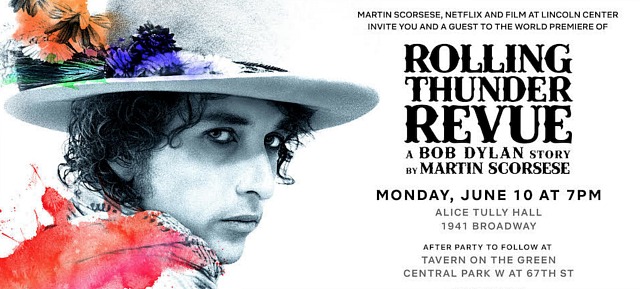
I’ve long accepted a notion that Robert Reich, the respected Berkeley-based professor, economist (Bill Clinton‘s secretary of labor from ’93 to ’97), author, documentarian (Inequality For All and political commentator, is the 21st Century’s Howard Zinn — a brilliant, plain-spoken seer who really does seem to carry the whole equation around in his head, and who’s been explaining it all in concise YouTube videos (over 200 so far) for the last four or five years.
The below video is on the longish side, but it explains how the four basic narratives of the American experience have been used and re-used over the decades.
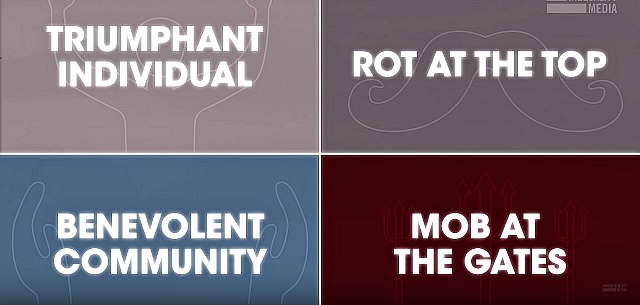
There are probably millions who’ve never heard of Stuart Symington. Do a Google search — he was the Joe Biden figure of the 1960 Democratic selection and primary process. The difference is that the elder-statesman-like Symington was 59 in ’60, or 17 years younger than Biden is today. You know who Biden also resembles? Harold Stassen. Yeah, I know — nobody knows him either.
Bill Maher: If you had to bet your own money, who’s gonna win the nomination?
Charlie Sykes: My own money? That’s very unfair. I’m gonna say Biden because the Democrats will be too afraid to go with somebody who might lose to Donald Trump, and at a certain point the panic will set it.
Maher to George Will: Do you think it’s gonna be Biden?
Will: I think at this point people are in politics and active in the nominating [process] because politics is fun. I think the most “fun” candidate for Democrats is Elizabeth Warren.
Martin Short: And I think it’s Mayor Pete!
Maher: You think Mayor Pete’s gonna win the nomination?
Bari Weiss: I think it could be him.
Short: When you talk about the debates, he is incapable of anything coming out of his mouth that isn’t impressive. I think he’s going to be phenomenal on television, and I think he’ll do a lot of…he’ll be everywhere, and if the Millennials would actually vote…if you’re 18**, 37 seems pretty old.
Weiss to Short: You think he could beat Trump?
Maher: I think it’ll be the dirtiest election ever. I mean no matter who it is.
Short: Trump is like an old [TV] series that you liked the first half-season [of]. I’m telling you [that] people get bored. His schtick is wearing thin.
Maher: Well, it already has and he’s down in the polls so we’ll see.
Director Franco Zeffirelli has passed in Rome at age 96. His films about great operatic passions and refined spiritual auras earned him…well, mostly praise for 35 years. From the Burton-Taylor Taming of the Shrew (’67) to Callas Forever (’02) A long illness finally brought things to a close. Hugs and condolences to friends, family, colleagues and fans.
Zeffirelli’s life was a fascinating study in strong currents and conflicts, especially when he got older. If it hadn’t been for the arch-conservative views and Catholic constipation, I could say something along the lines of “we should all enjoy lives as vast, industrious and passionate as his.”
Zeffirelli’s most highly regarded film was Romeo and Juliet (’68), which resulted in a Best Director Oscar nomination and for which I always had a special thing (Olivia Hussey‘s Juliet was smooth and sweet and earnest beyond measure). But by today’s standards it feels a tiny bit precious, perhaps a little too poised.
Honestly? I have slightly fonder memories these days of Baz Luhrman‘s Romeo + Juliet (’96). I’m also a bit more enamored of Renato Castellani’s 1954 version of Shakespeare’s tragedy, in which Laurence Harvey played Romeo.
Right now my favorite Zeffirelli is Jesus of Nazareth (’77) with Robert Powell, and then Romeo and Juliet followed by Mel Gibson‘s Hamlet (’90).
I met Zeffirelli when he visited Cannon publicity in ’87 or thereabouts. He may have been there to discuss the video release of Otello, the Placido Domingo-starring filmed opera, or perhaps some future project — memory fails. He struck me as a kindly, gentle, elegant man in all respects.
It was common knowledge that Zeffirelli was gay, but he was too right-wing conservative (he served two terms in the Italian senate as a member of Silvio Berlusconi‘s right-wing Forza Italia party) and staunchly Catholic to be open about it. He finally came out in ’96 at age 73.
This scene makes me feel so sad, and so curiously comfortable. Goes right through me. Of all the millions who’ve watched this scene over the last decade or so, maybe 2% had even a vague notion what Tommy Lee Jones was talking about. If that. All that dark and all that cold.
Obviously the second Democratic debate group, meeting in Miami on Thursday, 6.27, will be the one to watch. Pete Buttigieg vs. Uncle Joe Biden and Bernie Sanders (who hasn’t a prayer and can only spoil…face it), not to mention Kamala Harris, Kirsten Gillbrand and Andrew Yang plus noteworthy second-stringers like Marianne Williamson, John Hickenlooper and Eric Swalwell. Michael Bennet, whom nobody knows or cares about, will also participate.
The first group, gathering the night before on Wednesday, 6.26, will include three serious candidates — Elizabeth Warren, Amy Klobuchar ad Beto O’Rourke. The rest haven’t a prayer and they know it — Cory Booker, Julian Castro, Bill de Blasio, John Delaney, Tulsi Gabbard, Jay Inslee and Tim Ryan.
Hollywood Elsewhere is hoping and praying for an Uncle Joe gaffe or two…any kind of mistake or misstatement….anything in that realm.
The real long-haul candidates are Biden, Bernie, Buttigieg and Warren. And maybe Harris and O’Rourke. Bernie, a tough guy and a principled visionary but at the same time a stubborn old goat, has to man up, face facts (he can’t possibly win the nomination) and stop trying to block the inevitable.
Both debates will happen at the Adrienne Arsht Center for the Performing Arts of Miami-Dade County, 1300 Biscayne Blvd, Miami, FL 33132.
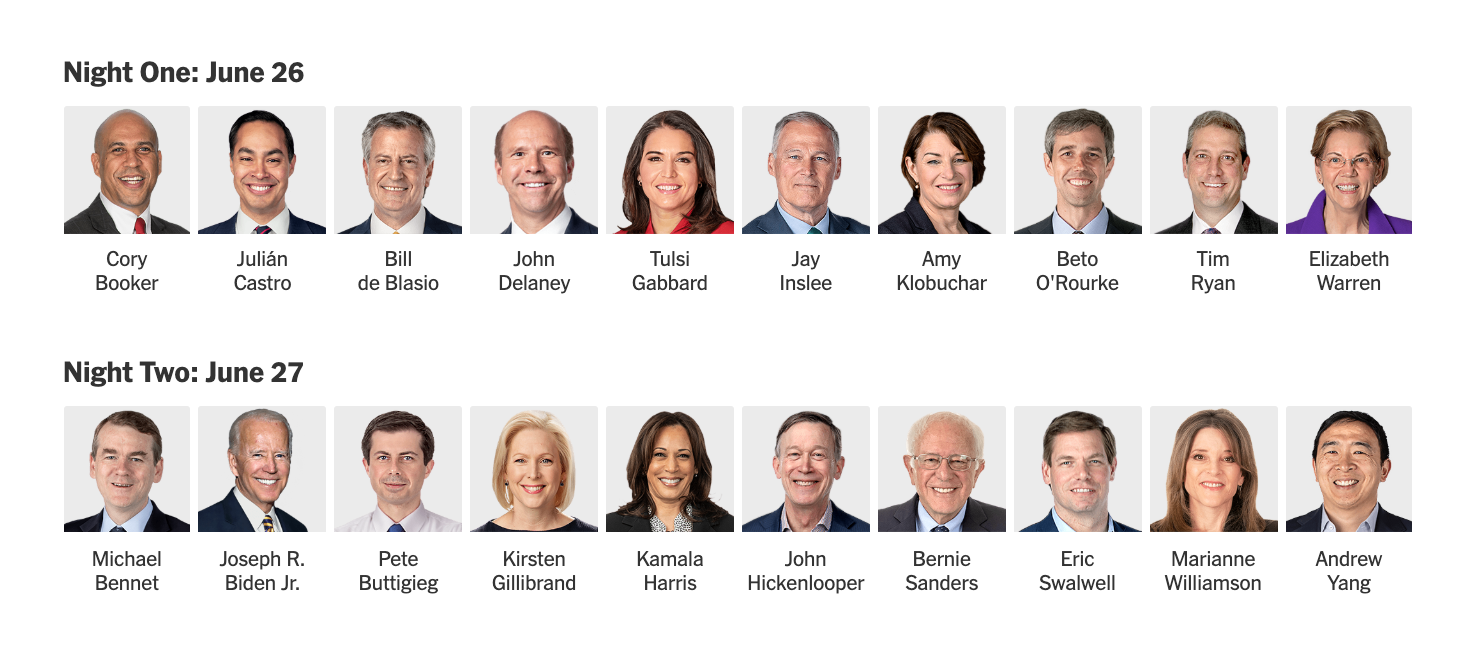
I knew from the get-go that both Shaft and Men in Black: International would blow chunks. So did everyone else. So I didn’t even try to see their press screenings because life is short. MIB:I has a 25% Rotten Tomatoes rating, and Shaft has a not-much-better 34% score. Now comes word that Men in Black: International and Shaft are both underperforming as we speak. I don’t care. Good riddance.